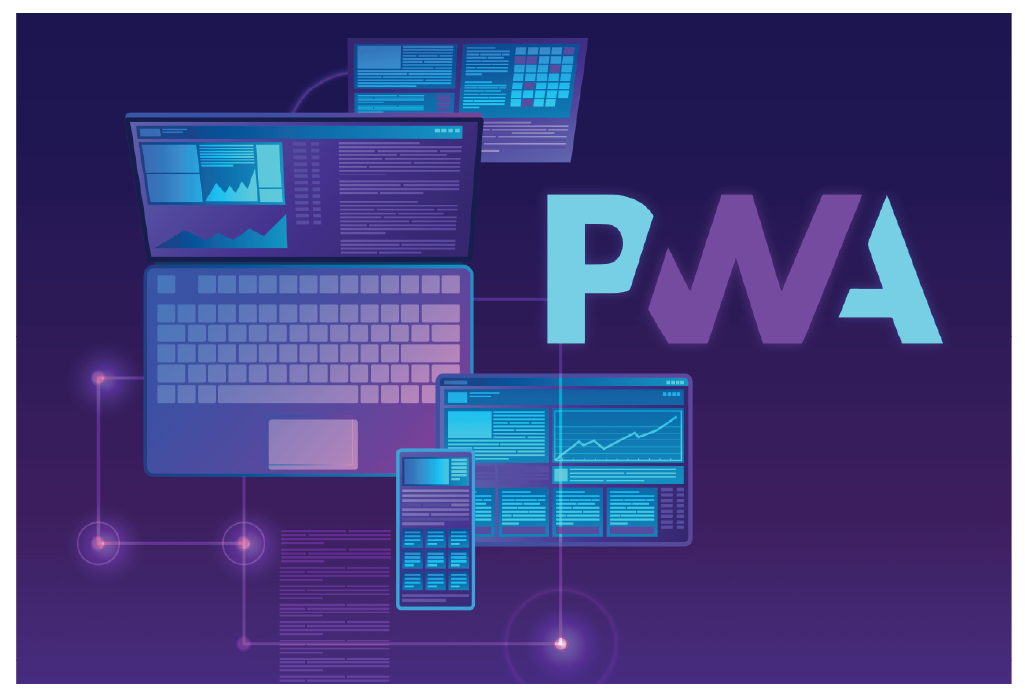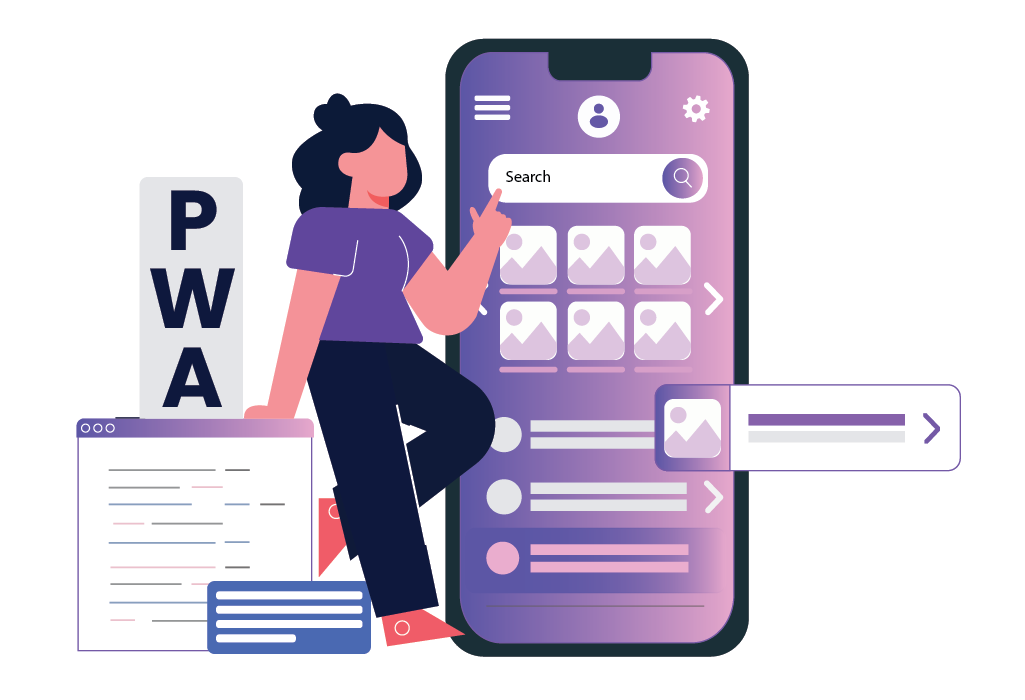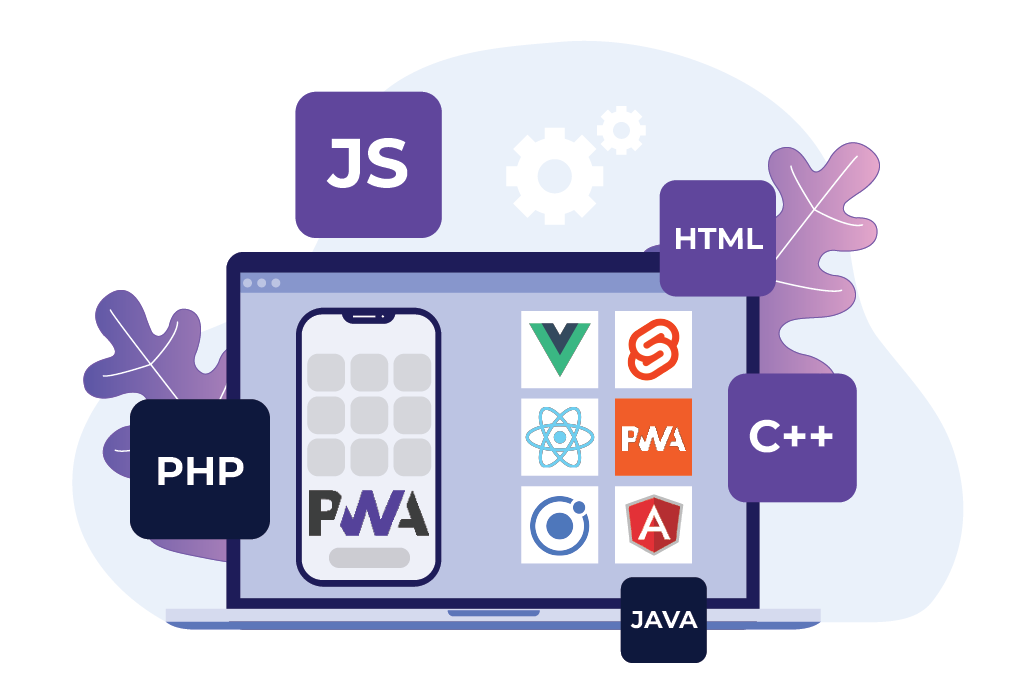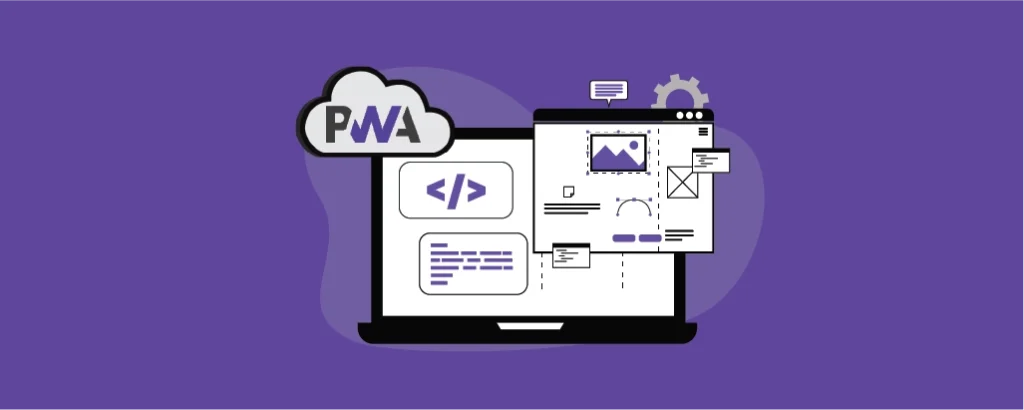Forging the Future: Exploring Progressive Web App Frameworks
The revolutionary paradigm shift in web development is epitomized by Progressive Web Apps (PWAs), which cleverly combine the best features of both regular websites and native mobile applications. These modern online applications, which combine cutting-edge web technology, transcend traditional limitations to give users an amazing and unmatched digital experience. Progressive web app frameworks have a strong focus on the user as they harness the power of cutting-edge web capabilities to offer a wide range of alluring advantages. The most important of these is their capacity to adjust to various screen sizes and devices without losing quality, enabling a consistent and visually appealing appearance across a variety of platforms, including PCs, smartphones, and tablets. These frameworks, such as Ionic, Angular, and React, empower developers to create responsive, offline-capable, and fast-loading web applications. By utilizing the power of service workers and modern web technologies, PWA frameworks enable organizations to convey consistent user experiences across devices, upgrading commitment and execution.
Progressive web app frameworks have a strong focus on the user as they harness the power of cutting-edge web capabilities to offer a wide range of alluring advantages. The most important of these is their capacity to adjust to various screen sizes and devices without losing quality, enabling a consistent and visually appealing appearance across a variety of platforms, including PCs, smartphones, and tablets. These frameworks, such as Ionic, Angular, and React, empower developers to create responsive, offline-capable, and fast-loading web applications. By utilizing the power of service workers and modern web technologies, PWA frameworks enable organizations to convey consistent user experiences across devices, upgrading commitment and execution.
Delving into the Core Attributes of PWA Frameworks
PWAs have transformed the digital landscape by enabling businesses to establish a lasting connection with their users regardless of the platform they choose to engage from. By bridging the gap between online and native app experiences, Progressive online Apps have become a disruptive force in the digital ecosystem. The following are the benefits of PWA frameworks:
Responsiveness and Secure: Progressive Web Applications (PWAs) succeed at obliging an extensive variety of screen sizes and device kinds because of their intrinsic flexibility. Whether open through laptops, cell phones, or tablets, this exceptional feature offers a reliable and easy-to-understand experience across numerous platforms. Users gain trust from PWAs’ consistent responsiveness since they know that their interactions will constantly be connected regardless of which device they use. In the digital world, security is of extreme importance, particularly while working with delicate data. PWAs effectively overcome this issue by just giving material over the safe HTTPS protocol. By ensuring data protection and wellbeing, its answer cultivates client certainty and confidence in the stage. PWAs are perceived as a reliable and dependable medium for engaging with delicate information because of their steady dedication to safeguarding client data.
Offline Functionality: PWAs’ extraordinary offline capacities are a distinctive trademark that separates them from different sites. PWAs intelligently cache crucial resources during online interactions by utilizing Service Workers’ skills. Users are provided the ability to get to content, view pages, and carry out necessary tasks without difficulty even when they are not connected to the internet thanks to caching. In addition to encouraging user interaction,, this liberating feature ensures that PWA experiences continue to be uninterrupted and engaging no matter what the condition of the network. PWAs take advantage of the fact that they are web-based to give users a constantly updated experience. PWAs consequently fetch and apply updates without requiring user input, rather than traditional native apps that demand human updating through app stores.
In addition to encouraging user interaction,, this liberating feature ensures that PWA experiences continue to be uninterrupted and engaging no matter what the condition of the network. PWAs take advantage of the fact that they are web-based to give users a constantly updated experience. PWAs consequently fetch and apply updates without requiring user input, rather than traditional native apps that demand human updating through app stores.
Quick Loading: PWAs are masterfully designed with speed and effectiveness as their main concerns. By significantly decreasing load times, they give consumers quick access to content and capabilities. PWAs decrease client annoyance by shortening the waiting time and lift engagement levels. Users are invited with almost immediate access to the required information, further improving the overall user experience and cultivating increased retention. PWAs’ ability to be installed is one of their distinctive and appealing features. Users have the choice to forego the traditional app store distribution mechanism and “install” a PWA straight onto their devices. An app-like icon is generated during this installation process, which is amazingly fast and simple, and it shows up on the home screen or app drawer. This usability ensures instant access to the PWA while emulating native app installations in terms of ownership and familiarity.
Cross-platform Compatibility: PWAs are the embodiment of inclusion and accessibility because they work easily on each platform that has a contemporary web browser. As a result of their cross-stage similarity, organizations and developers can try not to invest energy and money on platform-specific development. No matter what device or operating system they use, users may receive a comprehensive and consistent PWA. PWAs’ allure goes past that of conventional web applications because of their sharp execution of cutting-edge web technologies, with Service Workers acting as the engine. Users experience an enamoring, app-like experience therefore, with interactions that are rich, smooth and prompt. PWAs continue even during times of sporadic connectivity or when there is no active internet connection.
The Apex Selection: Unveiling the Top Progressive Web App Frameworks
Due to their ability to provide speed, reliability, and engagement, PWAs have become a preferred choice for businesses wishing to engage customers with immersive, high-performance web applications that automatically adapt to their needs and preferences. PWAs represent a dynamic growth in web development, ushering in an era of inclusivity, efficiency, and user happiness. The essential qualities of Progressive Web Apps uncover an abundance of advances and give an adaptable and comprehensive user experience. The best progressive web app frameworks are listed below:
React: The Paradigm-Shifting Power
Facebook’s React JavaScript toolkit has turned into a well known choice for making UIs, especially Progressive Web Apps (PWAs). Because of its virtual DOM and component-based architecture, it succeeds at building dynamic and intelligent PWAs. By effectively updating only the modified segments of an interface, the virtual DOM proficiently further develops rendering efficiency and improves user experience. React is the best PWA framework because its component-based approach additionally supports reusability and maintainability by empowering developers to separate confounded UIs into more modest, more reasonable components. React’s benefits for PWA development include, virtual DOM renders content effectively, improving performance, component-based architecture that is repeatable and maintainable, access to several libraries and productivity-boosting tools, and strong community backing with resources and active contributions. React’s drawbacks when developing PWAs: the framework’s initial learning curve for developers, and the requirement to pick from a variety of libraries and tools, which may be too much for certain people.
Angular: Empowering Web Applications with Pristine Structure
Developed and maintained by Google, Angular stands as an extensive and feature-rich framework for building vigorous PWAs. It comes in two principal adaptations: AngularJS (1.x) and Angular(2+), with the latter taking care of modern web development practices. Angular gives an end-to-end development suite, covering everything from data dealing with and dependency infusion to routing and testing. Its obstinate structure energizes the utilization of TypeScript, a composed superset of JavaScript, which upgrades code quality and development efficiency. Angular’s benefits for developing PWAs: complete developer suite with integrated tools and features, strong, maintainable code supported by TypeScript and an opinionated framework., appropriate for extensive PWAs with complicated needs, and constant updates and assistance from the Google team. Angular’s drawbacks when developing PWAs: a steeper learning curve, particularly for programmers unfamiliar with TypeScript and the Angular environment, and longer initial loading times due to larger bundle sizes compared to certain other frameworks.
Vue.js: The Eloquent Simplicity of Progressive Frontend Development
Vue.js is a dynamic JavaScript structure known for its simplicity and ease of integration. Its steady adoption approach permits engineers to bring Vue.js features bit by bit into existing activities, making it an appealing decision for both small and large-scale PWAs. This PWA framework offers excellent performance because of its lightweight nature and reactive data binding system. This reactivity empowers automatic UI refreshes whenever data changes, upgrading the responsiveness of PWAs. Vue.js flaunts major areas of strength for a developer community, guaranteeing that it remains well-supported and continually evolving. Vue.js’s benefits for PWA development include: gradual acceptance, allowing for easy integration into ongoing initiatives, compact and effective, resulting in quicker load times and easy user interactions, real-time UI modifications using reactive data binding, and a growing developer community that provides resources and help. Vue.js’s drawbacks for PWA development include: fewer third-party libraries and tools due to a smaller ecosystem than React and Angular, and less corporate support than React and Angular, which may have an impact on future upgrades and support.
This PWA framework offers excellent performance because of its lightweight nature and reactive data binding system. This reactivity empowers automatic UI refreshes whenever data changes, upgrading the responsiveness of PWAs. Vue.js flaunts major areas of strength for a developer community, guaranteeing that it remains well-supported and continually evolving. Vue.js’s benefits for PWA development include: gradual acceptance, allowing for easy integration into ongoing initiatives, compact and effective, resulting in quicker load times and easy user interactions, real-time UI modifications using reactive data binding, and a growing developer community that provides resources and help. Vue.js’s drawbacks for PWA development include: fewer third-party libraries and tools due to a smaller ecosystem than React and Angular, and less corporate support than React and Angular, which may have an impact on future upgrades and support.
Ionic: Bridging the Gap for Captivating Cross-Platform App Development
Ionic stands out as a wise option when PWA development necessitates a significant focus on mobile experiences. Ionic, which acts as a UI framework, makes use of well-known web technologies like HTML, CSS, and JavaScript to let developers create cross-platform PWAs that mimic the appearance and feel of native mobile apps. Ionic is notable for being built on top of the Angular framework, which it enhances with a variety of premade UI components. The following are some benefits of using Ionic for PWA development: focus on mobile experiences with a native app feel, makes use of well-known web technologies, making it usable by a wide range of developers, cross-platform compatibility, which enables PWAs to work reliably on a range of devices, and large library of UI components that have already been created to speed up development. Ionic’s drawbacks when developing PWAs: are dependence on Angular, which might not be ideal for developers who prefer other frameworks, and less customization flexibility compared to other UI frameworks.
Svelte: Redefining Frontend Elegance with Effortless Brilliance
Svelte is a relatively new player in the PWA development space and is becoming well-known for its creative methodology. During the construction process, Svelte converts components into vanilla JavaScript, a very efficient language, in contrast to conventional frameworks that run in the browser. PWA performance is improved and bundle sizes are reduced as a consequence of this compilation. Svelte benefits for developing PWAs include: reduced bundle sizes and enhanced performance as a result of compiling to stock JavaScript. a more straightforward development process with less runtime overhead, reactive data binding is supported for in-the-moment UI modifications, and growing appeal and active neighborhood support. Svelte drawbacks for PWA development include: compared to more established frameworks, it can have a smaller ecosystem because it is a newer framework, and fewer third-party tools and libraries in comparison to more mature alternatives.
PWA Studio: Where Progressive Web Apps Embrace the Art of Innovation
Progressive Web Application (PWA) Studio, a Magento-supported framework, revolutionizes PWA development with unrivaled advantages. It empowers organizations to further develop client experiences and increase conversion rates thanks to its consistent integration with Magento Commerce. Developers appreciate more productive development while utilizing ready-to-use components, bringing about PWAs with unmatched execution and responsive designs across devices. PWA Studio’s benefits incorporate simple coordination with Magento Commerce, which empowers organizations to take advantage of their ongoing data and functions for improved user experiences and more proficient e-commerce operations. The system has ready-to-use components, which speeds up development and liberates developers to focus on making PWAs with a lot of features. PWA Studio prepares developers to create high-performance PWAs with fast load times, smooth connections, and consistent offline capabilities, expanding client satisfaction and commitment. PWA Studio’s disadvantages incorporate the requirement for an expectation to learn and adapt to appropriately comprehend its possibilities for new users and developers new to Magento and its ecosystem. PWA Studio’s potential may just be completely acknowledged by skilled developers who are adroit at both Magento and PWA development, which might limit access for more modest organizations or those with compelled development assets.
Consolidating the Key Points
PWAs have improved performance, offline functionality, and an inherent app-like feel, all accessible through a regular web browser. There’s no doubt that native mobile applications are appealing, but progressive web app frameworks have uncovered a fantastic world of accessibility and variety. Because they offer a cutting-edge user experience that expertly combines the best aspects of both the online and native app worlds, progressive online apps represent the apex of an amazing innovation fusion.
These frameworks offer unique benefits for PWA development, catering to certain project requirements and development preferences. While Ionic focuses on giving native app-like experiences on mobile devices, PWA Starter Kit excels at establishing a strong foundation and best practices. Performance and a streamlined development process are prioritized by Svelte thanks to its distinctive compilation technique.
Pattern Digital: The Exemplary Purveyor of PWA Development Excellence
Experience the pinnacle of cutting-edge web solutions with our expert Progressive Web App development services, where the future of web experiences comes to life. Our team of specialists is adept in utilizing cutting-edge technology to create PWAs that are dynamic, responsive, and feature-rich. We enable your company to reach a wider audience with smooth offline functioning, clear user interfaces, and cross-platform compatibility. With our unrivaled PWA solutions, you can improve your online visibility and open up new opportunities. Enter a world of improved user engagement and success that is driven by performance.


